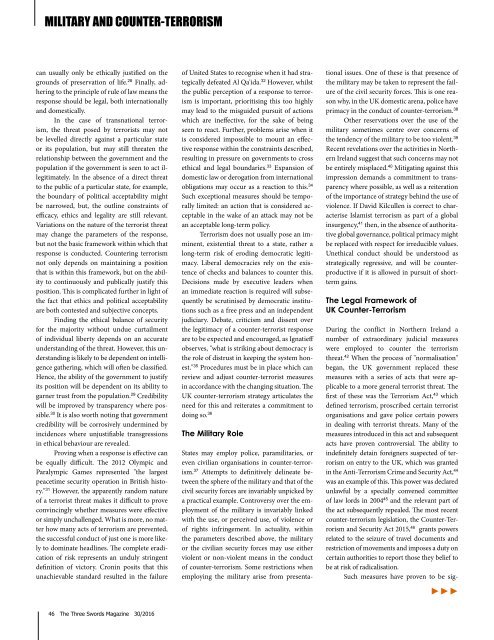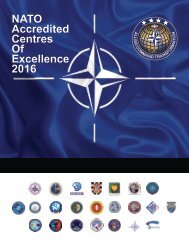TRIDENT ISSUE
7201_JWC_May2016_Magazine_ORIG_Low
7201_JWC_May2016_Magazine_ORIG_Low
You also want an ePaper? Increase the reach of your titles
YUMPU automatically turns print PDFs into web optimized ePapers that Google loves.
MILITARY AND COUNTER-TERRORISM<br />
can usually only be ethically justified on the<br />
grounds of preservation of life. 28 Finally, adhering<br />
to the principle of rule of law means the<br />
response should be legal, both internationally<br />
and domestically.<br />
In the case of transnational terrorism,<br />
the threat posed by terrorists may not<br />
be levelled directly against a particular state<br />
or its population, but may still threaten the<br />
relationship between the government and the<br />
population if the government is seen to act illegitimately.<br />
In the absence of a direct threat<br />
to the public of a particular state, for example,<br />
the boundary of political acceptability might<br />
be narrowed, but, the outline constraints of<br />
efficacy, ethics and legality are still relevant.<br />
Variations on the nature of the terrorist threat<br />
may change the parameters of the response,<br />
but not the basic framework within which that<br />
response is conducted. Countering terrorism<br />
not only depends on maintaining a position<br />
that is within this framework, but on the ability<br />
to continuously and publically justify this<br />
position. This is complicated further in light of<br />
the fact that ethics and political acceptability<br />
are both contested and subjective concepts.<br />
Finding the ethical balance of security<br />
for the majority without undue curtailment<br />
of individual liberty depends on an accurate<br />
understanding of the threat. However, this understanding<br />
is likely to be dependent on intelligence<br />
gathering, which will often be classified.<br />
Hence, the ability of the government to justify<br />
its position will be dependent on its ability to<br />
garner trust from the population. 29 Credibility<br />
will be improved by transparency where possible.<br />
30 It is also worth noting that government<br />
credibility will be corrosively undermined by<br />
incidences where unjustifiable transgressions<br />
in ethical behaviour are revealed.<br />
Proving when a response is effective can<br />
be equally difficult. The 2012 Olympic and<br />
Paralympic Games represented "the largest<br />
peacetime security operation in British history."<br />
31 However, the apparently random nature<br />
of a terrorist threat makes it difficult to prove<br />
convincingly whether measures were effective<br />
or simply unchallenged. What is more, no matter<br />
how many acts of terrorism are prevented,<br />
the successful conduct of just one is more likely<br />
to dominate headlines. The complete eradication<br />
of risk represents an unduly stringent<br />
definition of victory. Cronin posits that this<br />
unachievable standard resulted in the failure<br />
of United States to recognise when it had strategically<br />
defeated Al Qa'ida. 32 However, whilst<br />
the public perception of a response to terrorism<br />
is important, prioritising this too highly<br />
may lead to the misguided pursuit of actions<br />
which are ineffective, for the sake of being<br />
seen to react. Further, problems arise when it<br />
is considered impossible to mount an effective<br />
response within the constraints described,<br />
resulting in pressure on governments to cross<br />
ethical and legal boundaries. 33 Expansion of<br />
domestic law or derogation from international<br />
obligations may occur as a reaction to this. 34<br />
Such exceptional measures should be temporally<br />
limited: an action that is considered acceptable<br />
in the wake of an attack may not be<br />
an acceptable long-term policy.<br />
Terrorism does not usually pose an imminent,<br />
existential threat to a state, rather a<br />
long-term risk of eroding democratic legitimacy.<br />
Liberal democracies rely on the existence<br />
of checks and balances to counter this.<br />
Decisions made by executive leaders when<br />
an immediate reaction is required will subsequently<br />
be scrutinised by democratic institutions<br />
such as a free press and an independent<br />
judiciary. Debate, criticism and dissent over<br />
the legitimacy of a counter-terrorist response<br />
are to be expected and encouraged, as Ignatieff<br />
observes, "what is striking about democracy is<br />
the role of distrust in keeping the system honest."<br />
35 Procedures must be in place which can<br />
review and adjust counter-terrorist measures<br />
in accordance with the changing situation. The<br />
UK counter-terrorism strategy articulates the<br />
need for this and reiterates a commitment to<br />
doing so. 36<br />
The Military Role<br />
States may employ police, paramilitaries, or<br />
even civilian organisations in counter-terrorism.<br />
37 Attempts to definitively delineate between<br />
the sphere of the military and that of the<br />
civil security forces are invariably unpicked by<br />
a practical example. Controversy over the employment<br />
of the military is invariably linked<br />
with the use, or perceived use, of violence or<br />
of rights infringement. In actuality, within<br />
the parameters described above, the military<br />
or the civilian security forces may use either<br />
violent or non-violent means in the conduct<br />
of counter-terrorism. Some restrictions when<br />
employing the military arise from presentational<br />
issues. One of these is that presence of<br />
the military may be taken to represent the failure<br />
of the civil security forces. This is one reason<br />
why, in the UK domestic arena, police have<br />
primacy in the conduct of counter-terrorism. 38<br />
Other reservations over the use of the<br />
military sometimes centre over concerns of<br />
the tendency of the military to be too violent. 39<br />
Recent revelations over the activities in Northern<br />
Ireland suggest that such concerns may not<br />
be entirely misplaced. 40 Mitigating against this<br />
impression demands a commitment to transparency<br />
where possible, as well as a reiteration<br />
of the importance of strategy behind the use of<br />
violence. If David Kilcullen is correct to characterise<br />
Islamist terrorism as part of a global<br />
insurgency, 41 then, in the absence of authoritative<br />
global governance, political primacy might<br />
be replaced with respect for irreducible values.<br />
Unethical conduct should be understood as<br />
strategically regressive, and will be counterproductive<br />
if it is allowed in pursuit of shortterm<br />
gains.<br />
The Legal Framework of<br />
UK Counter-Terrorism<br />
During the conflict in Northern Ireland a<br />
number of extraordinary judicial measures<br />
were employed to counter the terrorism<br />
threat. 42 When the process of "normalisation"<br />
began, the UK government replaced these<br />
measures with a series of acts that were applicable<br />
to a more general terrorist threat. The<br />
first of these was the Terrorism Act, 43 which<br />
defined terrorism, proscribed certain terrorist<br />
organisations and gave police certain powers<br />
in dealing with terrorist threats. Many of the<br />
measures introduced in this act and subsequent<br />
acts have proven controversial. The ability to<br />
indefinitely detain foreigners suspected of terrorism<br />
on entry to the UK, which was granted<br />
in the Anti-Terrorism Crime and Security Act, 44<br />
was an example of this. This power was declared<br />
unlawful by a specially convened committee<br />
of law lords in 2004 45 and the relevant part of<br />
the act subsequently repealed. The most recent<br />
counter-terrorism legislation, the Counter-Terrorism<br />
and Security Act 2015, 46 grants powers<br />
related to the seizure of travel documents and<br />
restriction of movements and imposes a duty on<br />
certain authorities to report those they belief to<br />
be at risk of radicalisation.<br />
Such measures have proven to be sig-<br />
►►►<br />
46 The Three Swords Magazine 30/2016



